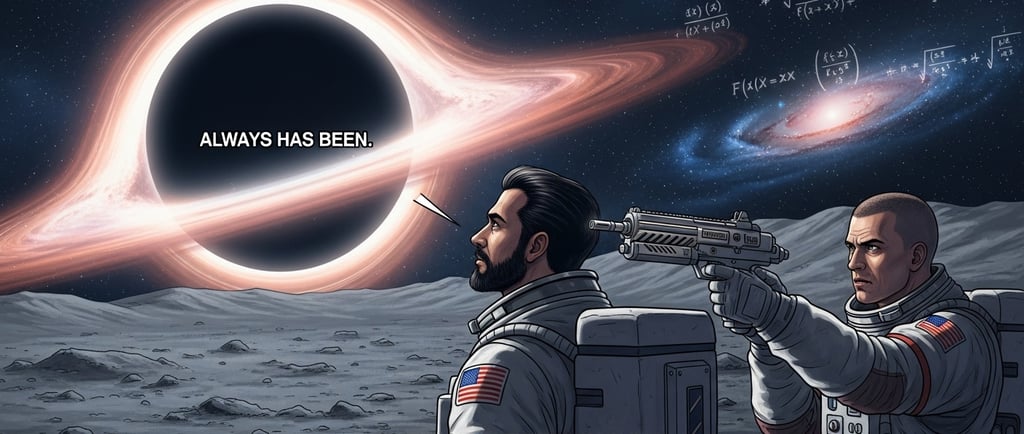Wait, It’s All Maths? Always Has Been!
Discover how mathematics underpins the universe's secrets, from ancient Vedic astrology to modern AI, robotics, and quantum computing. This piece explores math's hidden role in innovation, blending personal reflections with real-world applications, and debates whether pushing numeracy is key in our distracted world.
TECHNOLOGYPSYCHOLOGYFUTUREMATHEMATICS
Suraj Prasad
7/26/20253 min read


Being an Indian kid, one of the most central parts of your life is mathematics and scientific education. There's some next-level inclination toward math. Everyone I've ever known, friends, family, extended relatives, constantly hears how important mathematics is. But personally, I've had a love-hate relationship with the subject. Maybe because I never understood its capabilities as a kid.
As we went to school, math just seemed to go over my head. I never saw it applied anywhere in depth. During my bus journey to school, going out with friends, or eating out with parents, mathematics was never in sight. Except, its essence was hiding in plain sight.
What Makes Math Essential?
As a high school student, things used to just pass me by. I never understood why and where we apply differentiation and integration. I only learned that differentiation finds the rate of change and integration calculates the area under a curve. But what curve? And what area? My stomach? The Earth? It all seemed crazy until I delved deeper.
Differentiation and integration are fundamental concepts in calculus with widespread applications. Differentiation calculates rates of change, in physics, it determines velocity and acceleration from displacement functions. It finds maximum and minimum values in optimization problems and analyzes slopes of curves for graphical applications.
Integration calculates areas under curves, essential for irregular shapes or areas between curves. It determines accumulated values, like displacement from velocity or work from force. It solves differential equations modeling real-world phenomena.
Examples span fields: physics for velocity and fluid flow; engineering for structures and circuits; economics for cost functions; medicine for drug dosage; computer science for image processing and algorithms.
What's even more interesting is that calculus was independently developed by Sir Isaac Newton around age 23-24, driven by a sense of urgency to uncover deeper truths.
Math's Hidden Role in the Universe
A natural resentment toward mathematics feels like an invisible force stopping us from unlocking the universe's secrets. How else to explain its continuous use? For instance, scientists used Laplace transforms to smooth the image of Sagittarius A*, the black hole at our galaxy's center.
Laplace transforms convert differential equations into algebraic ones, simplifying complex problems in signal processing and engineering.
Rishi Sunak, the UK Prime Minister, made headlines in 2023 by pushing for every student in England to study math up to age 18. He slammed the UK's "anti-maths mindset" as an economic drag, noting poor numeracy costs billions and cuts earnings by £1,600 yearly without basic skills. Sunak's argument? Stronger math education builds smarter workers, drives growth, and reduces reliance on immigrants for tech jobs. In our TikTok-obsessed world, he says numeracy combats distractions, sharpening minds for science and innovation. It's about prepping kids for a data-driven future where math powers AI, engineering, and the economy.
The Debate: Sunak vs. Pegg
But Simon Pegg, the actor from Shaun of the Dead and Star Trek, fired back hard. In a 2023 Instagram rant, he called Sunak an "unmandated prick" and accused him of creating a "drone army of data-entering robots." Pegg argued forcing math on hating teens kills creativity and overlooks arts and humanities. His view? In our screen-addicted world, more rote learning adds burnout, pulling kids from true innovation like storytelling. It's a plea to let passions guide education, not forced mandates.
Who's right? Sunak's got a point: In our notification-flooded era, numeracy is key for breakthroughs. Math fuels logical thinking in AI, engineering, and finance, what the UK needs to compete. Better skills could ease immigration strains by filling tech gaps locally. Without it, distractions widen the skills divide, halting progress.
Pegg hits the human angle: Mandating math risks making school drudgery, especially with distractions everywhere. Not everyone's number-wired, forcing it might crush creativity, vital for innovation (artists inspiring tech designs). In a mental health-strained world, extra mandates could worsen stress.
I lean toward Sunak for practicality, math's foundational in our tech world, countering distractions, boosting talent, and easing immigration by homegrowing skills. But mix in Pegg's wisdom: Make it fun, not forced, to ignite real progress without dousing learning's joy.
Math's Interconnected Legacy
We must understand that civilization has advanced largely due to mathematics. From barter systems to Vedic astrology, computer science, finance, quantum computing, robotics, VLSI, and embedded technologies, to discovering new star systems, math propels us forward.
This invisible force connects everything, answering the universe's questions across fields. Embracing it isn't just academic; it's essential for our evolution. I strongly feel and believe that all the job-related scare will remain for those who don't want to delve into mathematics. However, for those who are ready to make mathematics their friend, they will remain relevant forever.
Suraj Prasad
Engineer at Esko


